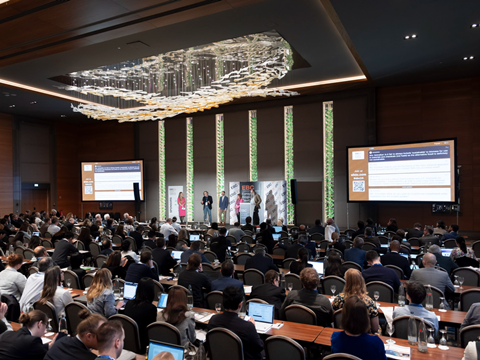
Attendees of this year’s European Bioplastics Conference in Berlin were reminded of bioplastics’ potential role in an EU-wide circular economy as the global production of plastics continues to rise, with additional encouragement to strategically manage biomass resources.
Nearly 50 industry stakeholders, leading experts, and researchers spoke at the conference, while 53 companies, researchers, and institutions exhibited their products, materials, and applications. Around 350 guests attended the event.
Sponsors included, but were not limited to, TotalEnergies Corbion, TÜV Austria, Wacker, and Emirates Biotech.
“We come to the end of a busy year with regulation falling into place, which mandate compostable packaging applications, provide a growth path for biobased plastics and boost biodegradable agricultural applications,” said co-chairs Mariagiovanna Vetere and Franz Kraus in their welcome address.
“We have a lot of hope in this European Parliament and European Commission, hope in the new industrial strategy, the Clean Industrial Deal, and in the relaunch of an EU bioeconomy strategy as one of its pillars.
“Biobased, biodegradable and compostable plastics are an integral part of the bioeconomy, and we are willing to play our part in addressing the problem of plastic pollution in soil and sea.”
This year’s sessions came to an overview of the global bioplastics landscape by examining current progress in the sector, weighing up sustainability milestones and environmental impact. Insights and trends from the European, American, Middle Eastern, and Chinese markets, among others, were presented.
According to the market data session, plastics production continues to rise steadily across the world. European Bioplastics believes that growth and innovation are still possible, with new data suggesting that scaling up is a possibility.
“The growth in bioplastics production capacity should be seen against the backdrop of increasing consumer awareness of the environmental impact associated with the overall plastic consumption, underscoring not only the resilience but also the significance of our industry to contribute to sustainable solutions,” says Hasso von Pogrell, managing director at European Bioplastics.
Keynote speaker Kristin Schreiber, director DG GROW.F at the European Commission, asserted that biomass resources must be strategically managed and underlined the inclusion of a biobased circular economy within the European Union’s long-term vision, with biobased materials set to help unlock a competitive and sustainability-minded EU economy.
She also invited participants to contribute to the success of the bioplastics market by sharing their own insights and contributions.
The next conference will be held in Berlin from 2nd – 3rd December 2025.
At the European Bioplastics Conference in 2022, the global capacity of bioplastics production was projected to increase by 4.7 million tonnes by 2027. Since then, European Bioplastics has published a Policy Manifesto calling upon the European Union to harmonize regulatory framework, introduce market incentives, and drive consumer awareness of bioplastics’ environmental benefits via a Biopolymers Industrial Action Plan.
Meanwhile, the Circular Bio-Based Europe Joint Undertaking HORIZON programme is funding the POLYMEER project, in which wet brewers’ spent grain is converted into high added value materials in an effort set to create new biobased polymers, copolymers, and polymer blends.
If you liked this story, you might also enjoy:
The ultimate guide to the Packaging and Packaging Waste Regulation in 2024
How are the top brands progressing on packaging sustainability?
Sustainable Innovation Report 2024: Current trends and future priorities
Everything you need to know about global plastic sustainability regulation













No comments yet